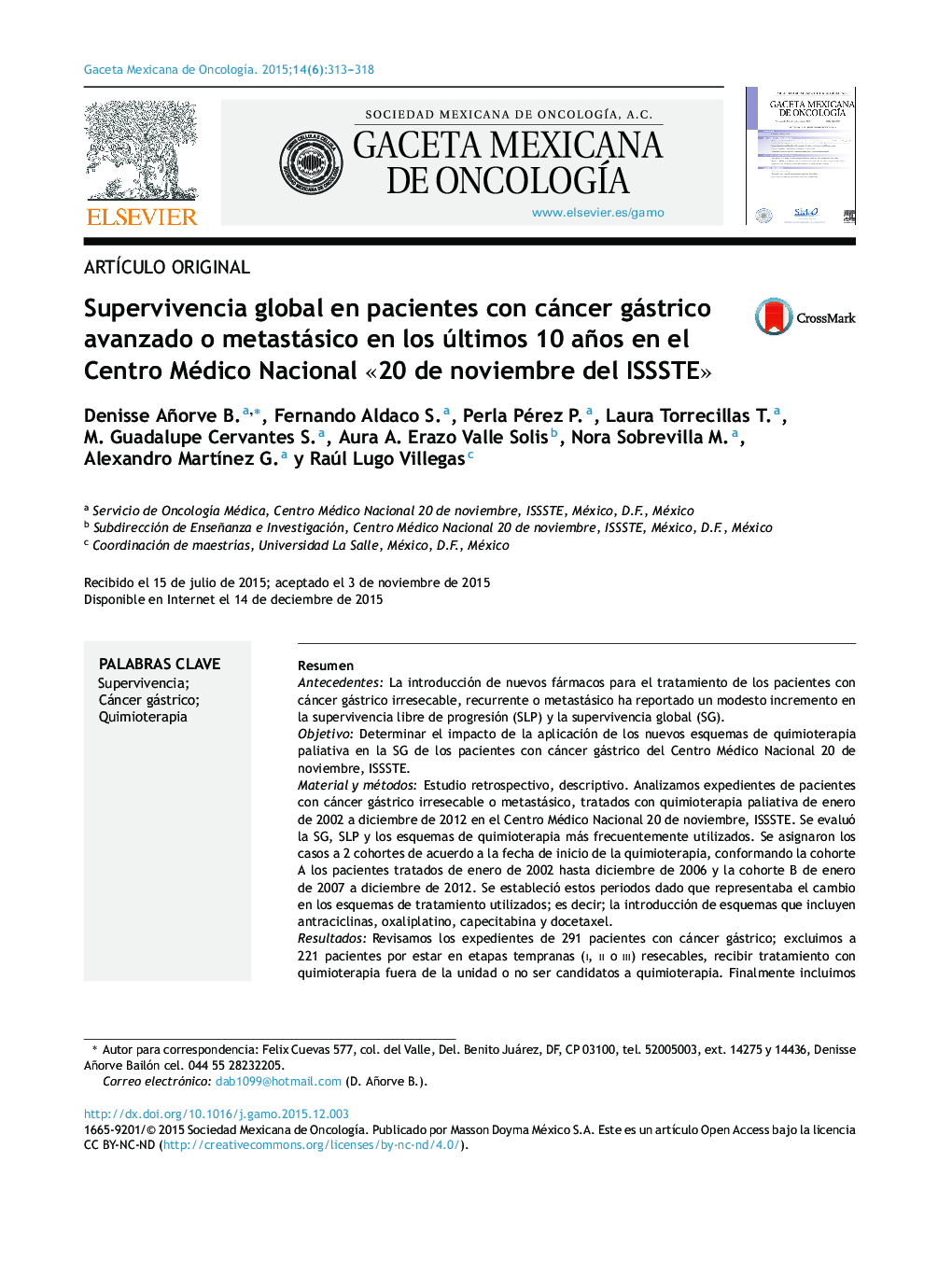| Article ID | Journal | Published Year | Pages | File Type |
|---|---|---|---|---|
| 3988633 | Gaceta Mexicana de Oncología | 2015 | 6 Pages |
ResumenAntecedentesLa introducción de nuevos fármacos para el tratamiento de los pacientes con cáncer gástrico irresecable, recurrente o metastásico ha reportado un modesto incremento en la supervivencia libre de progresión (SLP) y la supervivencia global (SG).ObjetivoDeterminar el impacto de la aplicación de los nuevos esquemas de quimioterapia paliativa en la SG de los pacientes con cáncer gástrico del Centro Médico Nacional 20 de noviembre, ISSSTE.Material y métodosEstudio retrospectivo, descriptivo. Analizamos expedientes de pacientes con cáncer gástrico irresecable o metastásico, tratados con quimioterapia paliativa de enero de 2002 a diciembre de 2012 en el Centro Médico Nacional 20 de noviembre, ISSSTE. Se evaluó la SG, SLP y los esquemas de quimioterapia más frecuentemente utilizados. Se asignaron los casos a 2 cohortes de acuerdo a la fecha de inicio de la quimioterapia, conformando la cohorte A los pacientes tratados de enero de 2002 hasta diciembre de 2006 y la cohorte B de enero de 2007 a diciembre de 2012. Se estableció estos periodos dado que representaba el cambio en los esquemas de tratamiento utilizados; es decir; la introducción de esquemas que incluyen antraciclinas, oxaliplatino, capecitabina y docetaxel.ResultadosRevisamos los expedientes de 291 pacientes con cáncer gástrico; excluimos a 221 pacientes por estar en etapas tempranas (i, ii o iii) resecables, recibir tratamiento con quimioterapia fuera de la unidad o no ser candidatos a quimioterapia. Finalmente incluimos 70 casos con tratamiento de primera línea. La mediana de SG para pacientes de la cohorte A fue de 11.2 vs. 10.5 meses para los pacientes de la cohorte B. La mediana de SLP en primera línea de tratamiento fue 8.5 vs. 5.2 meses respectivamente. Ambos resultados sin diferencia estadísticamente significativa.ConclusiónEn nuestro centro, no hay impacto de los nuevos esquemas de tratamiento en SLP o SG. Un tamaño de muestra pequeño y el hecho de que pacientes con pobre estado funcional recibieran quimioterapia podrían ser factores que influyeron en los resultados del estudio, en el cual se observó una tendencia a favor de los nuevos esquemas de quimioterapia, pero sin demostrar significación estadística.
BackgroundThe introduction of new drugs for the treatment of patients with advanced, recurrent or metastatic gastric cancer has resulted in a small benefit in overall survival (OS) and progression free survival (PFS).ObjectiveTo determine the impact of new chemotherapy schedules on the OS of patients with advanced or metastic gastric cancer treated at the Centro Medico Nacional 20 de noviembre, ISSSTE.Material and methodologyRetrolective, descriptive study, the clinical files of patients with advanced, recurrent or metastatic gastric cancer treated with chemotherapy at the Centro Medico Nacional 20 de noviembre, ISSSTE, from january 2002 to december 2012, were analyzed. Chemotherapy schedules, OS and PFS were evaluated. Patients were assigned to two cohorts: those treated from january 2002 to december 2006 were included in cohort A and those treated from january 2007 to december 2012 in cohort B. These time periods were determined based on the years when newer chemotherapy agents (anthracyclines, oxaliplatin, capecitabine and docetaxel) were introduced in our institution.Results291 clinical files were analyzed; 221 patients were excluded for they had clinical stage I, II or resectable III disease, started first line chemotherapy as outpatients of our institution or were not candidates for chemotherapy. 70 cases treated with first line chemotherapy were included. OS for patients in cohort A was 11.2 months vs 10.5 months for patients in cohort B. PFS was 8.5 months vs 5.2, respectively. There was no statistical difference in either comparison.ConclusionThere was no impact of the introduction of newer chemotherapy agents in OS or PFS in patients treated in our institution. A small sample size and the fact that patients with poor performance status received chemotherapy could have had influenced the results of our study, in which tendency towards a better outcome for patients treated with newer chemotherapy schemes was observed, although a statistically significant benefit was not proven.
